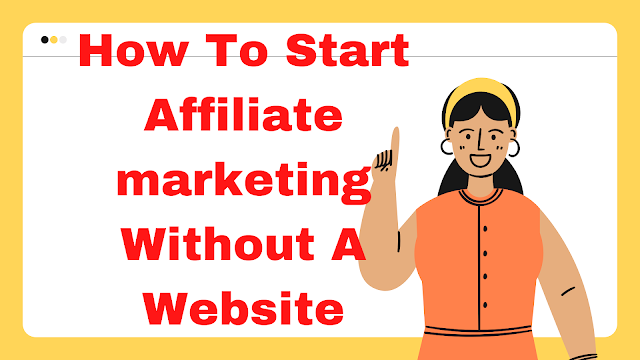How to Start Affiliate Marketing Without a Website: A Step-By-Step Guide
How to Start Affiliate Marketing Without a Website: A Step-By-Step Guide
When people think of affiliate marketing, they mostly think about working with a website or blog. The truth is that affiliate marketing doesn't require you to have a website and there are many other ways you can grow your business without one. In this post we're going to take a look at each type of affiliate marketing and the pros and cons of each so you can determine which is best for your business.
Section 1: Affiliate marketing without a website
Your first problem with going down the affiliate marketing path without a website is a lack of traffic. While you might be able to reach your audience through various social media platforms, it's a lot harder to get your message across and gain loyalty for your products or services if you're not publishing regularly.
Even if you have a decent following on social media, most people on those networks are making connections and interacting with each other, rather than looking for content to follow or click on. This is why people start blogging and why most companies have an official blog.
Another way to get traffic to your blog or website is to link up with other companies and bring their visitors to yours. Your link and affiliate revenue should both go through your website.
Affiliate marketing with a website
If you are in the business of selling products, there are many potential avenues to expand your reach. Websites or blog sites make sense to promote the sales of your products and so if you're not ready to design a whole new site, then promoting through these is still a viable option. But the main problem with website affiliate marketing is that it takes a long time to build and is by no means an easy task.
For example, if you want to promote your books then you can't just design a blog and hope that people visit it. You have to hire an editor, an editor assistant, and a graphic designer to help you. On top of that you also have to write your content and the quality of your work can vary wildly depending on the skills of your people.
Your website is also primarily a sales funnel.
The Pros of Site-less affiliate marketing
There are a number of good reasons why people choose to do affiliate marketing without a website. They may be taking advantage of affiliate marketing fees offered by big affiliate websites, but they may also be content creators who prefer to work outside the website platform. Many people have websites for SEO reasons and some opt to sell products online and hope that the reviews from their customers will lead them to success in marketing and in sales.
How to do Affiliate Marketing without a Website
However, there are also plenty of people who are content creators who like affiliate marketing because of the flexibility and lack of boundaries. The reason they choose to do this is because they're still able to have a relationship with their readers.
Click here: to get the best web hosting for your blogs and website and get a 50% discount
The Cons of Site-less affiliate marketing
The biggest downside of site-less affiliate marketing is the fact that the majority of websites do not make money. If your goal is to make money online, you're much better off having your website designed by an expert than having a random stranger try to guess what your site should look like.
It's also a lot harder to attract traffic to your website if you don't have a website. The odds are much better if you have a website that brings in traffic to your affiliate site. And the more you affiliate with websites, the more traffic you'll receive. If you're looking to affiliate with websites, you're better off investing in a paid membership program like Affiliate Marketing Academy.
How to get started with site-less affiliate marketing
In the first type of affiliate marketing, which is called "site-less" affiliate marketing, you just need to pay to get some freebies on a website. For instance, if you were to pay Amazon $10 for the right to have a banner on the sidebar of the company's website, that is an affiliate marketing strategy.
There are also variations of this type of marketing where you can earn cash simply for reading content from a site. One popular example is writing guest posts on sites, such as Medium or TheNextWeb. Another popular variation is to promote brands on your social media feeds. Many content creators actually use these strategies to make a living, but they work best for businesses that are highly specific and aren't going after a general audience.
Conclusion
Affiliate marketing is a useful and easy way to grow your business but there are some limitations so it's always a good idea to be aware of what you're signing up for. Take this post for example, even if you do everything right, you'll still probably make less than $1,000 a year.


Post a Comment